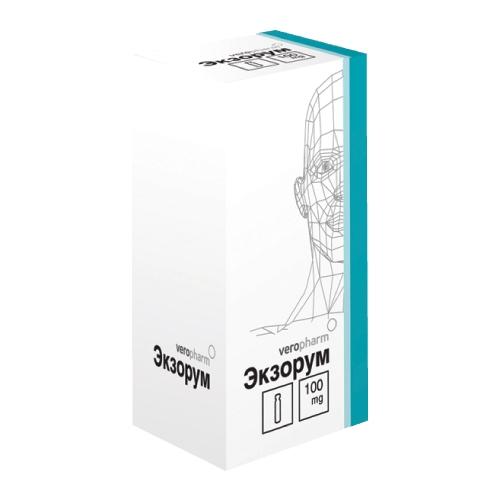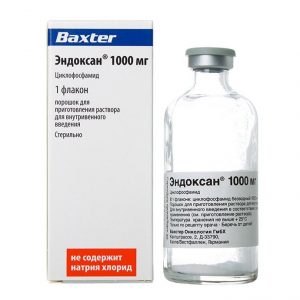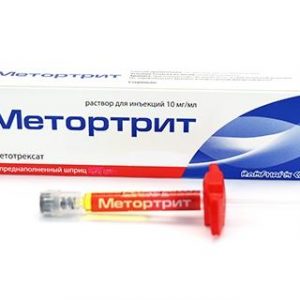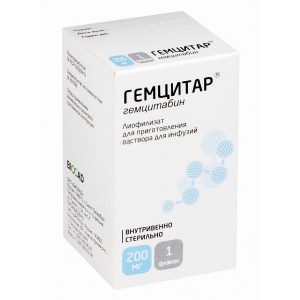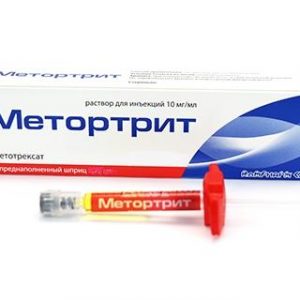Description
Dosage form
Lyophilisate for solution for infusion
Pharmacological action
Pharmacodynamics.
Oxaliplatin is an antitumor drug belonging to a new class of platinum derivatives, in which the platinum atom forms a complex with oxalate and 1, 2-diaminocyclohexane. Oxaliplatin exhibits a wide range of cytotoxic effects. It also exhibits in vitro and in vivo activity on various cisplatin-resistant tumor models. In combination with 5-fluorouracil, a synergistic cytotoxic effect is observed.
A study of the mechanism of action of oxaliplatin confirms the hypothesis that biotransformed, aqueous derivatives of oxaliplatin, interacting with DNA by forming inter- and intra-traction bridges suppress DNA synthesis, which leads to cytotoxicity and antitumor effect.
In vivo, oxaliplatin undergoes active biotransformation and is not detected in plasma by the end of 2-hour administration at a dose of 85 mg / m, with 15% of the administered platinum being in the blood, and the remaining 85% is rapidly distributed to tissues or excreted in the urine. Platinum binds to plasma albumin and is excreted in the urine during the first 48 hours.
By the fifth day, about 54% of the entire dose is found in urine and less than 3% in feces.
In renal failure, there is a significant decrease in Cl oxaliplatin from (17.6 ± 2.18) l / h to (9.95 ± 1.91) l / h. The effect of severe renal failure on clearance of platinum has not yet been studied.
Indications
Disseminated colorectal cancer (as monotherapy or combination therapy in combination with fluoropyrimidines).
Contraindications
hypersensitivity to oxaliplatin or other components of the
drug myelosuppression (neutrophil count <2000 / μl and / or platelet count <100000 / μl) before the first course of treatment peripheral sensory neuropathy with the first course of treatment with the beginning of the course of treatment with functional impairment impaired renal function (Cl creatinine <30 ml / min) pregnancy period of breastfeeding. Special instructions The administration of oxaliplatin should be carried out under the supervision of a physician experienced in the use of cytotoxic drugs. Constant monitoring of possible toxic effects in the treatment of oxaliplatin is mandatory. Regularly (1 time per week), as well as before each administration of the Exorum preparation, monitoring of the formed elements of peripheral blood and indicators of renal and liver function should be carried out. Before each cycle of therapy with Exorum begins, a neurological examination should be performed to identify signs of neurotoxicity. Patients should be informed of the possibility of persistent symptoms of peripheral sensory neuropathy after completion of treatment. Localized moderate paresthesia with functional impairment can last up to 3 years after the end of treatment according to the adjuvant regimen of the drug. If respiratory symptoms (dry cough, dyspnea, wheezing, or pulmonary infiltrates are detected by x-ray), treatment with Exorum should be suspended until interstitial pneumonitis is ruled out. Symptoms such as dehydration, paralytic ileus, bowel obstruction, hypokalemia, metabolic acidosis and renal failure can be caused by severe diarrhea or vomiting, especially when using Exorum in combination with 5-fluorouracil. Patients with a history of allergic reactions to other platinum compounds should be monitored for allergic symptoms. In the case of a reaction to oxaliplatin, similar to anaphylactic, the infusion should be immediately interrupted and appropriate symptomatic treatment should be prescribed. Further use of the drug Exorum in case of allergic reactions is contraindicated. In case of extravasation, the infusion should be stopped immediately and local symptomatic treatment should be started. The remaining dose should be injected into another vein. Women and men should use reliable methods of contraception during treatment with oxaliplatin. When using the drug Exorum, all the usual instructions accepted for the use of cytotoxic drugs must be followed. If the lyophilisate or solution of the drug Exorum gets on the skin or mucous membranes, they should be immediately and thoroughly washed with water. Composition 1 vial contains 50 mg of oxaliplatin. Excipients: lactose monohydrate. Dosage and administration of IV in the drip in the form of 2-6-hour infusions. Oxaliplatin is used only in adults. Hyperhydration with oxaliplatin is not required. If oxaliplatin is used in combination with 5-fluorouracil, an infusion of oxaliplatin should precede the administration of 5-fluorouracil. The recommended dose is 85 mg / m2 once every 2 weeks as monotherapy or in combination with 5-fluorouracil. Repeated injections of oxaliplatin are performed only with neutrophils> 1500 / Ñl and platelets> 50,000 / Ñl.
Recommendations for dose adjustment and oxaliplatin administration regimen.
In case of hematologic abnormalities (neutrophil count <1500 / Ñl and / or platelet count <50,000 / Ñl), the next course is delayed until the laboratory parameters are restored. With the development of diarrhea 4 degrees of toxicity (according to the WHO scale), neutropenia 3-4 degrees (the number of neutrophils <1000 / Ñl), thrombocytopenia of 3-4 degrees (platelet count <50,000 / Ñl), the dose of oxaliplatin should be reduced from 85 to 65 mg / m2 in subsequent administrations in addition to the usual dose reduction of 5-fluorouracil in case of their combined use. In patients who develop acute laryngeopharyngeal paresthesia during infusion or within a few hours after a 2-hour infusion, the next infusion of oxaliplatin should be carried out within 6 hours. Recommendations for adjusting the dose of oxaliplatin with the development of neurotoxicity: for symptoms of neurotoxicity causing pain, lasting more than 7 days or with paresthesia without functional impairment, which persists until the next cycle, the subsequent dose of oxaliplatin should be reduced by 25%. – with paresthesia with functional impairment, persisting until the next cycle, oxaliplatin should be canceled – with a decrease in the severity of symptoms of neurotoxicity after the abolition of oxaliplatin, you can consider resuming treatment. With the development of stomatitis and / or mucositis of the 2nd or more degree of toxicity, treatment with oxaliplatin should be suspended until they are stopped or the manifestations of toxicity are reduced to the 1st degree. Patients with renal failure. There are no data on the use of the drug in patients with severe renal impairment. Due to the limited data on the safety and tolerability of the drug in patients with a moderate degree of impaired renal function, the benefit / risk ratio for the patient should be weighed before using oxaliplatin. Therapy in this category of patients can be started with the recommended dose, under close monitoring of kidney function. With a mild degree of impaired renal function, dose adjustment of oxaliplatin is not required. Patients with liver failure. Dosage adjustment in patients with mild or moderate liver failure is not required. There are no data on the use of oxaliplatin in patients with severely impaired liver function. Elderly patients. The safety profile of oxaliplatin as a monotherapy or when combined with 5-fluorouracil in patients older than 65 years is similar to that observed in patients under 65 years of age. Instructions for the preparation of a solution of the drug When preparing and administering the drug Exorum, you cannot use needles and other equipment containing aluminum. Do not dissolve lyophilisate and dilute solution 0, 9% sodium chloride solution and mix with other saline (alkaline) solutions or solutions containing chlorides. To dissolve the lyophilisate, use water for injection or a 5% dextrose solution. At the same time, a sufficient amount of solvent is added to the bottle with the Exorum preparation to obtain a solution at a concentration of 5 mg / ml. Immediately after dissolving the lyophilisate, start preparing the solution for infusion. To prepare an infusion solution, the dissolved Exorum preparation is diluted in 250 ² 500 ml of a 5% dextrose solution to obtain a concentration of at least 0.2 mg / ml. The solution for infusion is recommended to be used immediately after preparation. The infusion solution remains stable for 24 hours at a temperature of 2 to 8 ° C. A solution with signs of precipitation must be destroyed. You can use only a clear solution. A solution of oxaliplatin should not be mixed in the same infusion system with other drugs, especially 5-fluorouracil and calcium folinate. The drug cannot be administered undiluted. Side effects The frequency of adverse reactions below is set out in accordance with the following gradation: very often (> 1/10) often (> 1/100,? 1/10) sometimes (> 1/1000,? 1/100 ) rarely (> 1/10000,? 1/1000) very rarely (? 1/10000), including individual messages.
From the hemopoietic system: very often – anemia, leukopenia, neutropenia, thrombocytopenia, lymphopenia often – febrile neutropenia (including grade 3-4), sepsis with neutropenia rarely – hemolytic anemia, immune thrombocytopenia.
From the digestive system: very often – nausea, vomiting, diarrhea, stomatitis, mucositis, pain in the stomach, constipation, loss of appetite often – dyspepsia, gastroesophageal reflux, hiccups sometimes – intestinal obstruction rarely – colitis, including cases of pseudomembranous colitis.
From the side of the central nervous system and peripheral nervous system: very often – peripheral neurosensory neuropathy, sensory disturbances, headache, asthenia often – dizziness, meningism, depression, insomnia, sometimes – increased nervousness rarely – dysarthria.
Neurotoxicity is a dose-limiting side effect. Symptoms of sensory neuropathy are often triggered by cold. The duration of these symptoms, which usually stop between the courses, increases depending on the total dose of oxaliplatin. Functional impairment which are expressed by the difficulty of performing precise movements, are possible consequences of sensory damage. The risk of functional impairment for a total dose of about 850 mg / m2 (10 cycles) is about 10%, reaching 20% ??in the case of a total dose of 1020 mg / m2 (12 cycles). In most cases, neurological symptoms improve or completely disappear after discontinuation of treatment. However, in 3% of patients, 3 years after the end of treatment, either stable localized paresthesia of moderate intensity (2.3%) or paresthesia affecting functional activity (0.5%) was observed.
Acute neurosensory manifestations were noted during treatment with oxaliplatin, which usually occurred within a few hours after drug administration and were most often triggered by cold. They were characterized by transient paresthesia, dysesthesia or hypesthesia, rarely (1-2%) – acute syndrome of laryngeal pharyngeal dysesthesia.
The latter was manifested by a subjective feeling of dysphagia and shortness of breath without objective signs of respiratory distress syndrome (cyanosis or hypoxia), or laryngeal spasm or bronchospasm (without stridor or wheezing). Also observed were spasm of the jaw muscles, tongue dysesthesia, dysarthria and a feeling of pressure in the chest. Typically, these symptoms quickly stopped both without the use of drug therapy, and with the introduction of antihistamines and bronchodilators. An increase in the infusion time during subsequent cycles of oxaliplatin therapy can reduce the frequency of this syndrome.
From the musculoskeletal system: very often – back pain often – arthralgia, bone pain.
On the part of the respiratory system: very often – cough, dyspnea is often rhinitis, infections of the upper respiratory tract rarely – pulmonary fibrosis.
From the cardiovascular system: often – pain behind the sternum, deep vein thrombophlebitis, pulmonary thromboembolism.
From the urinary system: often – hematuria, dysuria.
From the side of the skin and skin appendages: very often – alopecia, skin rashes often – peeling of the skin of the hands and feet, erythematous rashes, excessive sweating, irregularities in the nails.
On the part of the organs of vision and hearing: often – conjunctivitis, visual impairment rarely – transient decrease in visual acuity, loss of visual fields, hearing loss, neuritis of the auditory nerve.
Allergic reactions: rarely (with monotherapy) or often (in combination with 5-fluorouracil ± calcium folinate) bronchospasm may occur, angioedema, hypotension and anaphylactic shock.
Often there have been cases of allergic manifestations such as a rash (especially urticaria), conjunctivitis, or rhinitis.
Local reactions: with extravasation of the drug, pain and inflammatory reactions at the injection site.
On the part of laboratory indicators: very often – increased levels of alkaline phosphatase, activity of “liver” enzymes, bilirubin, lactate dehydrogenase, hypokalemia, impaired sodium and glucose in the blood serum often – increased creatinine.
Others: very often – increased body temperature, increased fatigue, increased body weight, taste disturbances.
Drug Interactions
There was no significant change in the binding of oxaliplatin to plasma proteins in vitro while using erythromycin, salicylates, granisetron, paclitaxel and sodium valproate.
When interacting with aluminum, precipitation and a decrease in the activity of oxaliplatin are possible.
Pharmaceutically incompatible with 0.9% sodium chloride solution and other saline (alkaline) solutions or solutions containing chlorides.
Overdose
Symptoms: a more pronounced manifestation of side effects.
Treatment: symptomatic. Careful monitoring of the patient and strict monitoring of hematological parameters is recommended. The antidote to oxaliplatin is unknown.
Storage conditions
In a dry, dark place at a temperature of no higher than 25 ° C. Infusion solution – during the day, at a temperature of 2-8 ° C.
Term hodnosty
2 years
Deystvuyuschee substances
oxaliplatin
Form of Treatment
simply entails dlya infusing
Lance-Farm, Ross ia
